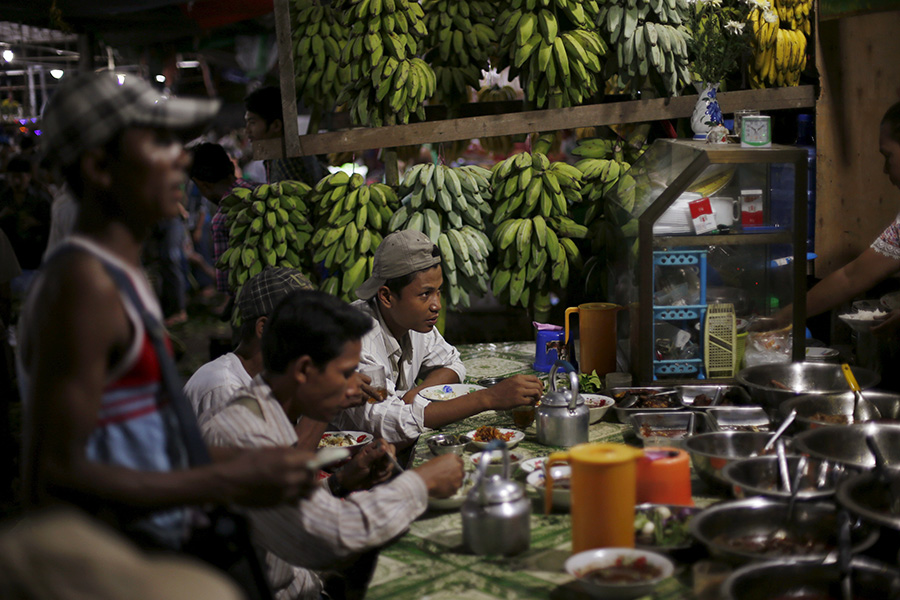YANGON — As Myanmar’s new daily minimum wage of 4,800 kyats (USD3.50) takes effect, labor-rights advocates are emphasizing that further steps are needed, including monitoring to ensure that workers are actually being paid the full amount, and that their basic needs are being met.
Monday’s increase was the first since the country introduced a minimum wage of 3,600 kyats ($2.65) in September 2015. However, a lack of proper enforcement mechanisms means many people are still working for below minimum wage, more than two-and-a-half years after the law was passed, said Daw Khaing Zar Aung, a member of the Confederation of Trade Unions Myanmar (CTUM)’s executive committee.
The confederation is currently assisting two groups of workers totaling about 200 people in two factories who are still not being paid the minimum wage, she said.
“It is important to make sure all employees get paid the minimum wage of 4,800 kyats,” she said.
Daw Khaing Zar Aung added that public forums need to be conducted in other states and regions in order to raise awareness about the minimum wage, along with monitoring and follow-up work.
The new rate of 4,800 kyats took effect Monday, according to an announcement by the National Committee for Designating Minimum Wages. The committee said the rate for an eight-hour working day would not apply to small, family-run businesses that employ fewer than 10 people.
The rate was decided in March after a long period of consultation. It faced objections from both workers and employers, with most workers demanding an average minimum wage of 5,600 kyats and employers unwilling to pay more than 4,000 kyats.
Daw Hla Hla, an executive member of the All Myanmar Trade Union, said 4,800 kyats is not sufficient to cover the daily living costs of workers.

The country’s Minimum Wage Law states that the wage must meet the essential needs of workers and their families, but the current rate isn’t even sufficient for one person to survive on, let alone their families, she said.
The All Myanmar Trade Union has called for a minimum wage of 5,600 kyats since 2015, said Daw Hla Hla.
CTUM’s Daw Khaing Zar Aung, who is also a member of the National Committee for Designating Minimum Wages, said she wasn’t satisfied with the 4,800-kyats rate, either.
The committee comprises economists, officials from concerned ministries and representatives of labor and employer groups.
She said the committee was unable to properly surveys workers’ living costs in states and divisions due to time constraints. As a result, some of the survey results do not accurately reflect the workers’ real cost of living, she added.
The group advised the committee to conduct regular meetings every six months. It also urged it to meet with employees and employers periodically to update them and to conduct follow-up work. It recommended more time be spent conducting the surveys, she said.
Another significant problem is that some employers cut other allowances and benefits when the basic wage is increased.
Such problems were encountered when the country’s first minimum wage of 3,600 kyats was established in 2015, said Ko Ye Naing Win, a labor rights advocate who previously worked for the Arbitration Council for Labor Disputes.
He said employers had reduced or abolished allowances and other benefits, so there was not much difference for workers. Commodity prices had increased, putting pressure on employers and leading to labor strikes, he added.
The government needed to protect the rights of the laborers, he said.
The minimum wage is intended as a basic salary for unskilled workers (especially those entering the workforce), and pay raises are still expected to be paid as an employee gains in skill and experience, he said.
“The new rate is does not fully cover employees’ cost of living, but employers claim they have difficulty paying more than that. Given that, the government also needs to draft policies for the betterment of employees,” Ko Ye Naing Win said.
He stressed the need to implement welfare schemes for workers such as housing projects with low-priced rental apartments and low-cost restaurants to ease the impact of rising living costs.
Under the Minimum Wage Law, a new rate must be enacted every two years.

















